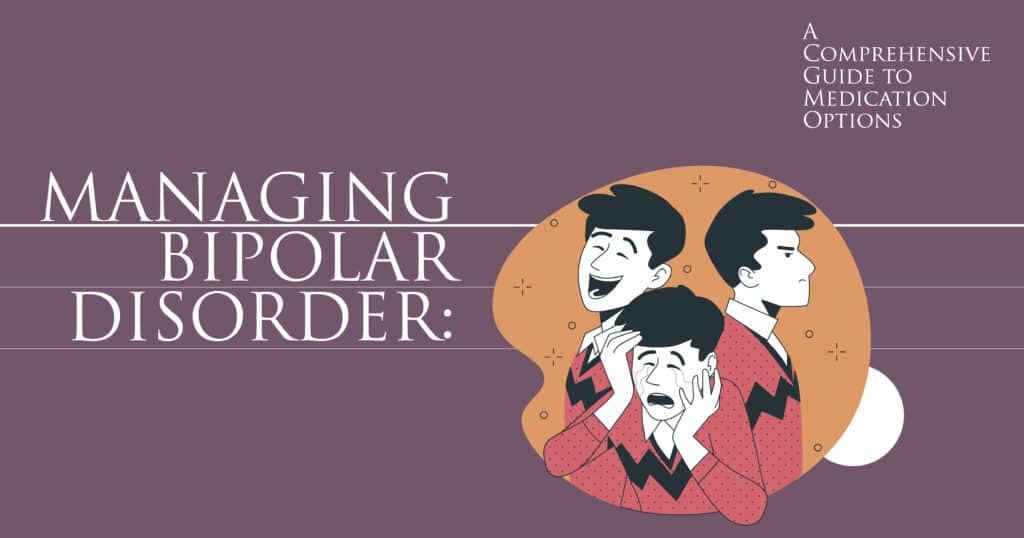Bipolar disorder is a complex mental health condition characterized by extreme mood swings, including emotional highs (mania or hypomania) and lows (depression). Effective management of bipolar disorder often requires a combination of therapies, with medication playing a central role. In this comprehensive guide, we will explore the various medication options for managing bipolar disorder, their benefits, potential side effects, and strategies for effective treatment. This blog post will help you understand the available medication options and how they can be used to manage bipolar disorder effectively.
Table of Contents
- Understanding Bipolar Disorder
- The Role of Medication in Managing Bipolar Disorder
- Types of Medications for Bipolar Disorder
- Mood Stabilizers
- Antipsychotic Medications
- Antidepressants
- Benzodiazepines
- How to Choose the Right Medication for Bipolar Disorder
- Potential Side Effects of Bipolar Disorder Medications
- Monitoring and Adjusting Your Medication
- Complementary Therapies and Lifestyle Changes
- When to Seek Professional Help
- Conclusion
San Jose Mental Health
Understanding Bipolar Disorder
Bipolar disorder is a mental health condition characterized by dramatic mood swings that include emotional highs (mania or hypomania) and lows (depression). These mood swings can significantly impact daily life and affect relationships, work, and overall well-being.
What Are the Types of Bipolar Disorder?
- Bipolar I Disorder: Defined by manic episodes lasting at least seven days or manic symptoms that are so severe they require immediate hospital care. Depressive episodes occur as well, typically lasting at least two weeks.
- Bipolar II Disorder: Characterized by a pattern of depressive episodes and hypomanic episodes, but no full-blown manic episodes.
- Cyclothymic Disorder: Includes periods of hypomanic symptoms and periods of depressive symptoms lasting for at least two years (one year in children and adolescents). Still, symptoms do not meet the criteria for a hypomanic episode or major depressive episode.
- Other Specified and Unspecified Bipolar and Related Disorders: Bipolar symptoms that do not match the above categories but still cause significant distress or impairment.
Bipolar spectrum disorders encompass these variations and may present with mixed features, such as simultaneous symptoms of mania and depression, also known as mixed episodes. The management of patients with these disorders often requires specialized interventions.
The Role of Medication in Managing Bipolar Disorder
Medication plays a crucial role in stabilizing mood and managing symptoms of bipolar disorder. It helps to balance the highs and lows associated with the condition and improve overall functioning.
Why Medication is Important
- Stabilizes Mood Swings: Medications help manage episodes of mania and depression, providing stability.
- Prevents Relapses: Effective medication use can reduce the frequency and severity of mood episodes.
- Improves Quality of Life: Proper medication management can enhance daily functioning and emotional well-being.
Bipolar disorder treatment often requires addressing other comorbid conditions such as anxiety disorders and alcohol use disorders. Effective treatment plans must consider the risk of recurrence and risk of harm, particularly during severe episodes of depression in adults.
Types of Medications for Bipolar Disorder
Several classes of medications are used to manage bipolar disorder. Each type of medication works in different ways to address symptoms and maintain stability.
Mood Stabilizers
Mood stabilizers are often the first line of treatment for bipolar disorder. They help to control mood swings and prevent relapses.
- Lithium
- What It Is: A classic mood stabilizer used for both manic and depressive episodes.
- Benefits: Effective in reducing the frequency of mood swings and preventing episodes. Lithium therapy is especially noted for its role in stabilizing mood over the long term.
- Side Effects: Tremors, increased thirst, frequent urination, weight gain, thyroid issues. Some patients may experience extra-pyramidal effects.
- Monitoring: Regular blood tests are needed to check lithium levels and kidney function. Lithium-treated patients require ongoing monitoring to manage potential adverse effects.
- Valproic Acid (Valproate or Divalproex Sodium)
- What It Is: A medication used to manage manic episodes and maintenance therapy.
- Benefits: Effective in treating acute mania and preventing future episodes.
- Side Effects: Weight gain, hair loss, liver toxicity, gastrointestinal issues. It can be particularly useful in managing rapid cycling episodes.
- Monitoring: Regular liver function tests are required.
- Lamotrigine
- What It Is: A mood stabilizer used to manage depressive episodes and prevent relapses.
- Benefits: Effective for long-term mood stabilization and managing depressive symptoms.
- Side Effects: Skin rashes, headaches, dizziness, nausea. Lamotrigine is noted for its ability to manage depression in adults effectively.
- Monitoring: No routine blood tests are required, but skin rashes should be monitored due to the risk of severe skin reactions.
- Carbamazepine
- What It Is: A medication used for manic episodes and mood stabilization.
- Benefits: Helps to manage severe mania and stabilize mood.
- Side Effects: Drowsiness, dizziness, double vision, liver issues. This medication may also be used in combination with other treatments for acute episodes.
- Monitoring: Regular blood tests are needed to check for blood cell counts and liver function.
Antipsychotic Medications
Antipsychotics are used to manage manic episodes, psychotic symptoms, and mood stabilization.
- Olanzapine
- What It Is: An atypical antipsychotic used for acute mania and maintenance.
- Benefits: Effective for managing both manic and depressive episodes.
- Side Effects: Weight gain, diabetes risk, sedation, increased cholesterol. Olanzapine is often used when acute phase symptoms are severe.
- Monitoring: Weight, blood sugar, and cholesterol levels should be monitored.
- Quetiapine
- What It Is: An atypical antipsychotic used for both acute mania and depression.
- Benefits: Effective for managing symptoms of both mania and depression.
- Side Effects: Drowsiness, weight gain, dry mouth, dizziness. It can be beneficial for patients with mixed features of bipolar disorder.
- Monitoring: Regular checks for weight and metabolic syndrome.
- Risperidone
- What It Is: An atypical antipsychotic used for manic episodes and mood stabilization.
- Benefits: Helps to reduce manic symptoms and stabilize mood.
- Side Effects: Weight gain, drowsiness, tremors, increased cholesterol. Risperidone is useful in addressing episodes of mania and acute depression.
- Monitoring: Weight, blood sugar, and cholesterol levels should be monitored.
Antidepressants
Antidepressants are used to manage depressive episodes, often in combination with mood stabilizers to prevent manic episodes.
- Selective Serotonin Reuptake Inhibitors (SSRIs)
- Examples: Fluoxetine, Sertraline.
- Benefits: Effective for treating depressive symptoms.
- Side Effects: Nausea, insomnia, sexual dysfunction. SSRIs are often used as part of initial treatment strategies for depressive episodes.
- Monitoring: This may need to be adjusted in combination with mood stabilizers to avoid inducing mania.
- Serotonin-Norepinephrine Reuptake Inhibitors (SNRIs)
- Examples: Venlafaxine, Duloxetine.
- Benefits: Effective for treating depressive symptoms and managing chronic pain.
- Side Effects: Dry mouth, dizziness, increased blood pressure.
- Monitoring: Regular blood pressure checks and mood monitoring.
Benzodiazepines
Benzodiazepines are sometimes used short-term to manage acute anxiety or agitation.
- Examples: Lorazepam, Clonazepam.
- Benefits: Provides rapid relief from acute anxiety or agitation.
- Side Effects: Drowsiness, dizziness, dependency. Benzodiazepines are not typically used long-term due to the risk of dependence.
- Monitoring: Use only as prescribed due to the potential for dependence.
How to Choose the Right Medication for Bipolar Disorder
Selecting the correct medication involves a collaborative approach between the patient and healthcare provider, considering the specific needs and conditions of the individual.
Factors to Consider When Choosing Medication
- Type of Bipolar Disorder: Different medications are recommended for Bipolar I, Bipolar II, or Cyclothymic Disorder. Bipolar spectrum disorders may also require specialized treatment.
- Current Symptoms: Focus on treating the most pressing symptoms, whether manic or depressive. Episodes of mania and acute depression may necessitate different approaches.
- Previous Treatment History: Consider past responses to medications and side effects experienced. Reviewing past treatment outcomes can guide current decisions.
- Side Effects: Discuss potential side effects and how they might impact daily life. Adverse effects like movement disorders and neuroleptic-induced acute akathisia must be considered.
- Long-term Management: Evaluate the medication’s role in long-term mood stabilization and prevention of relapses. This includes addressing longitudinal episodes and managing frequent episodes.
Medication adherence is critical for effective treatment, especially given the risk of harm associated with untreated bipolar disorder symptoms.
San Jose Mental Health
Potential Side Effects of Bipolar Disorder Medications
Understanding medications’ potential side effects helps manage expectations and improve treatment adherence.
Common Side Effects
- Lithium: Tremors, weight gain, thyroid issues. Lithium therapy can also lead to irreversible movement disorders in some cases.
- Valproic Acid: Weight gain, liver toxicity.
- Lamotrigine: Skin rashes, dizziness.
- Antipsychotics (Olanzapine, Quetiapine, Risperidone): Weight gain, diabetes risk, drowsiness. Extra-pyramidal effects and nervous system diseases may occur.
- Antidepressants (SSRIs, SNRIs): Nausea, sexual dysfunction. Tricyclic antidepressants may also have a role in managing severe depression in adults.
- Benzodiazepines: Drowsiness, dependency.
Managing Side Effects
- Regular Check-Ups: Routine monitoring of health metrics and medication levels.
- Report Symptoms: Notify your healthcare provider about any side effects that are concerning. Behavioral interventions and family interventions can also be useful in managing side effects.
- Adjust Dosages: Your provider may adjust or switch medications to manage side effects. Comparative effectiveness review studies can provide guidance on managing side effects.
Monitoring and Adjusting Your Medication
Effective management of bipolar disorder often requires ongoing evaluation and adjustment of medications.
How to Monitor Medication Effectiveness
- Track Symptoms: Keep a mood journal to record episodes and medication effects. Mood disorder questionnaires can help in tracking changes in mood.
- Regular Appointments: Attend scheduled appointments for medication reviews and adjustments. Regular analysis of accuracy studies can support treatment decisions.
- Lab Tests: Follow through with recommended blood tests and health checks.
Adjusting Your Medication
- Dosage Changes: Your provider may adjust dosages based on symptom severity and side effects. This includes managing phase of illness and episode of mania.
- Medication Switching: If one medication is not practical or causes severe side effects, alternatives may be considered. Naturalistic 4-year follow-up study results may inform these decisions.
Complementary Therapies and Lifestyle Changes
In addition to medication, specific therapies and lifestyle changes can support the management of bipolar disorder.
Complementary Therapies
- Psychotherapy: Cognitive Behavioral Therapy (CBT) and Dialectical Behavior Therapy (DBT) for managing symptoms and improving coping strategies. Cognitive behavior therapy is particularly effective in managing irritable mood and acute episodes.
- Psychoeducation: Learning about bipolar disorder to better manage symptoms and treatment.
- Support Groups: Joining groups for emotional support and shared experiences. Group-based psychosocial interventions can enhance treatment efficacy.
Lifestyle Changes
- Healthy Diet: Balanced nutrition to support mental and physical health. Consider adding omega-3 fatty acids to your diet as part of lifestyle interventions.
- Regular Exercise: Physical activity to stabilize mood and reduce stress.
- Adequate Sleep: Establishing a regular sleep routine to support mood stability. Addressing sleep disturbances is critical for managing phases of illness.
- Stress Management: Techniques such as mindfulness and relaxation exercises. Light therapy and social rhythm therapy can help in maintaining a consistent daily routine and stabilizing moods.
When to Seek Professional Help
Knowing when to seek professional help is essential for effective management of bipolar disorder.
Signs You Should Seek Professional Help
- Severe Mood Episodes: Intense manic or depressive episodes that are difficult to manage.
- Medication Concerns: Problems with medication effectiveness or severe side effects.
- Increased Symptoms: Significant changes in mood or functioning despite treatment. This includes managing disturbances in patients that may indicate a need for inpatient care.
- Crisis Situations: Suicidal thoughts or behaviors or severe agitation. Antisuicidal agents may be needed in critical situations.
Professional Resources
- Mental Health Professionals: Psychiatrists, psychologists, or licensed therapists. Collaborate with your health care provider to manage complex cases.
- Crisis Hotlines: Available for immediate support during mental health emergencies.
- Treatment Centers: Specialized facilities for intensive treatment and management. International Society for Bipolar Disorders guidelines can be used for best practices.
Evaluation of patients with bipolar disorder often requires a multidisciplinary approach, including a primary care physician, family physician, and mental health specialists to address both psychiatric conditions and any underlying medical illnesses.
San Jose Mental Health
Conclusion
Managing bipolar disorder effectively involves a comprehensive approach that includes a range of medication options, lifestyle changes, and ongoing support. Understanding the various medications, their benefits, and potential side effects can help individuals make informed decisions about their treatment. Integrating evidence-based guidelines and patient care strategies can improve outcomes in patients with bipolar disorder. By considering the comprehensive needs of bipolar spectrum disorders, patients can better manage their condition and enhance their quality of life.








